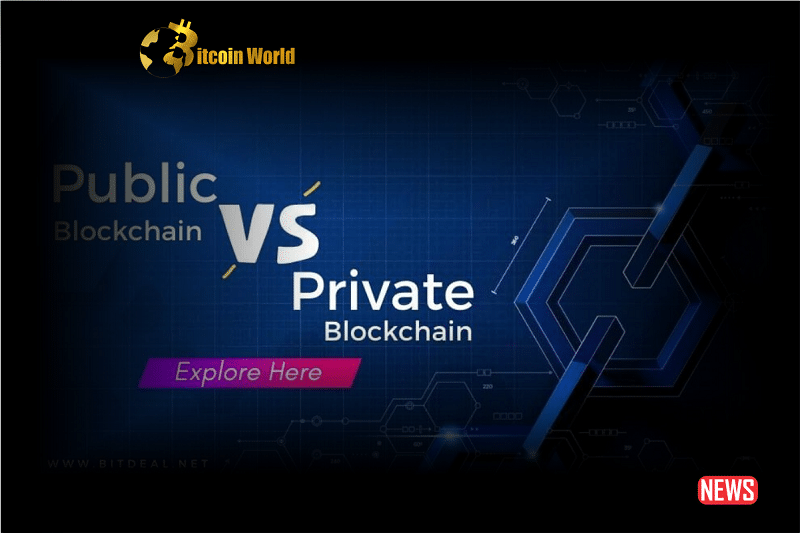The world of blockchain is constantly evolving, and the conversation around public versus private blockchains is far from over. Recently, Paul Brody, the Global Blockchain Leader at Ernst & Young (EY), stirred the pot at the Real World Asset Summit with his rather direct views on the matter. Hint: he’s leaning heavily towards one side. Let’s unpack what Brody said and why it matters for anyone invested in the future of blockchain technology.
Brody’s Bold Stance: Private Blockchains on the Way Out?
Paul Brody didn’t mince words. Speaking after the Real World Asset Summit, a key industry event focused on the future of tokenization and digital assets, he voiced a strong opinion: private blockchains might be losing the race. Specifically, he pointed a finger at large financial institutions still heavily invested in private chain solutions, like R3 Corda. Brody suggests their focus might be misplaced, especially with the relentless rise of public platforms like Ethereum.
This isn’t just casual commentary. Brody’s perspective, coming from a leader at a major firm like EY, carries weight. EY itself has been actively involved in the blockchain space, even developing tools to bridge traditional finance with the crypto world. So, when Brody speaks, the industry listens.
Real World Asset Summit: Setting the Stage for Debate
The Real World Asset Summit, held on September 19th and backed by crypto heavyweights like Coinbase and Circle, was the backdrop for Brody’s remarks. This wasn’t just a casual get-together; it was a focused event bringing together 40 prominent figures in Decentralized Finance (DeFi). Think names like Robert Leshner from Compound and Jesse Pollak from Base – serious players shaping the future of finance.
While Brody’s tweet didn’t specify which expert triggered his comments, the summit itself provided a fertile ground for discussions around the direction of blockchain technology, particularly the ongoing tug-of-war between public and private networks.
Public Blockchains: The Allure of Openness
So, what’s fueling Brody’s conviction about public blockchains? It boils down to core principles:
- Decentralization at its Heart: Public blockchains are built on the idea of distributed control, removing single points of failure and fostering trust through transparency.
- Open Access for Everyone: Forget exclusive clubs. Public blockchains are permissionless. Anyone with an internet connection and a crypto wallet can jump in.
- Universal Accessibility: Want to transact, mint NFTs, or explore DeFi? Platforms like Ethereum are open for business to anyone, anywhere.
- User-Friendly Gateways: Hot wallets like MetaMask and Coinbase Wallet act as easy-to-use portals to interact with these public networks.
In contrast to some networks with limited functionality, public blockchains, particularly Ethereum, offer a rich ecosystem of possibilities.
Ethereum’s Ascendancy: Numbers and Big Names Don’t Lie
The numbers speak volumes about the traction of public blockchains, especially Ethereum:
- Market Dominance: As of September 20th, Ethereum’s market capitalization soared past $195 billion. That’s not pocket change.
- Industry Giants Endorsing Public: Visa and PayPal, mainstream financial powerhouses, are actively building on Ethereum.
Let’s break down these endorsements:
- Visa’s Ethereum Play: Visa is working on enabling users to pay Ethereum gas fees directly with their credit cards. This is huge for mainstream adoption, removing the initial hurdle of acquiring ETH to use the network.
- PayPal’s PYUSD Stablecoin: PayPal launched its stablecoin, PYUSD, and chose to build it on – you guessed it – Ethereum. This signifies a major vote of confidence in Ethereum’s infrastructure for real-world financial applications.
EY’s Multi-Chain Vision: Embracing the Public Landscape
Interestingly, EY, while Brody questions private chains, showcases a broader understanding of the blockchain ecosystem. Their Blockchain Analyzer tool, designed for auditors to seamlessly interact with blockchain data, has expanded its reach. Initially supporting major players like Ethereum and Bitcoin, it now includes Dogecoin, demonstrating a commitment to a multi-chain future, but notably, heavily weighted towards public, open networks.
The Ongoing Blockchain Saga: Public vs. Private – A Debate That Matters
The discussion around public and private blockchains is far from settled. While Brody’s perspective is strong, the blockchain space is dynamic and diverse. Private chains might still find their niche, particularly in situations demanding strict privacy and control. However, the momentum and real-world adoption are undeniably swinging in favor of public blockchains.
Key Takeaways:
- Brody’s Skepticism: A leading voice at EY questions the long-term viability of private blockchain strategies, especially for mass adoption.
- Public Blockchain Advantages: Decentralization, open access, and a thriving ecosystem are driving the growth of public platforms like Ethereum.
- Real-World Adoption: Major players like Visa and PayPal are actively integrating with public blockchains, signaling a shift in the industry.
- EY’s Broader View: While questioning private chains, EY’s tools support a range of blockchains, including public giants and even meme coins, reflecting the evolving landscape.
- The Debate Continues: The future of blockchain will likely involve a mix of solutions, but the trend towards public, open networks is becoming increasingly clear.
As the blockchain universe expands, understanding the nuances between public and private chains is crucial. Brody’s comments serve as a valuable point of reflection, urging businesses and institutions to carefully consider where they place their bets in this rapidly evolving technological landscape. The conversation is open, the debate is lively, and the future of blockchain is still being written.
Disclaimer: The information provided is not trading advice, Bitcoinworld.co.in holds no liability for any investments made based on the information provided on this page. We strongly recommend independent research and/or consultation with a qualified professional before making any investment decisions.




